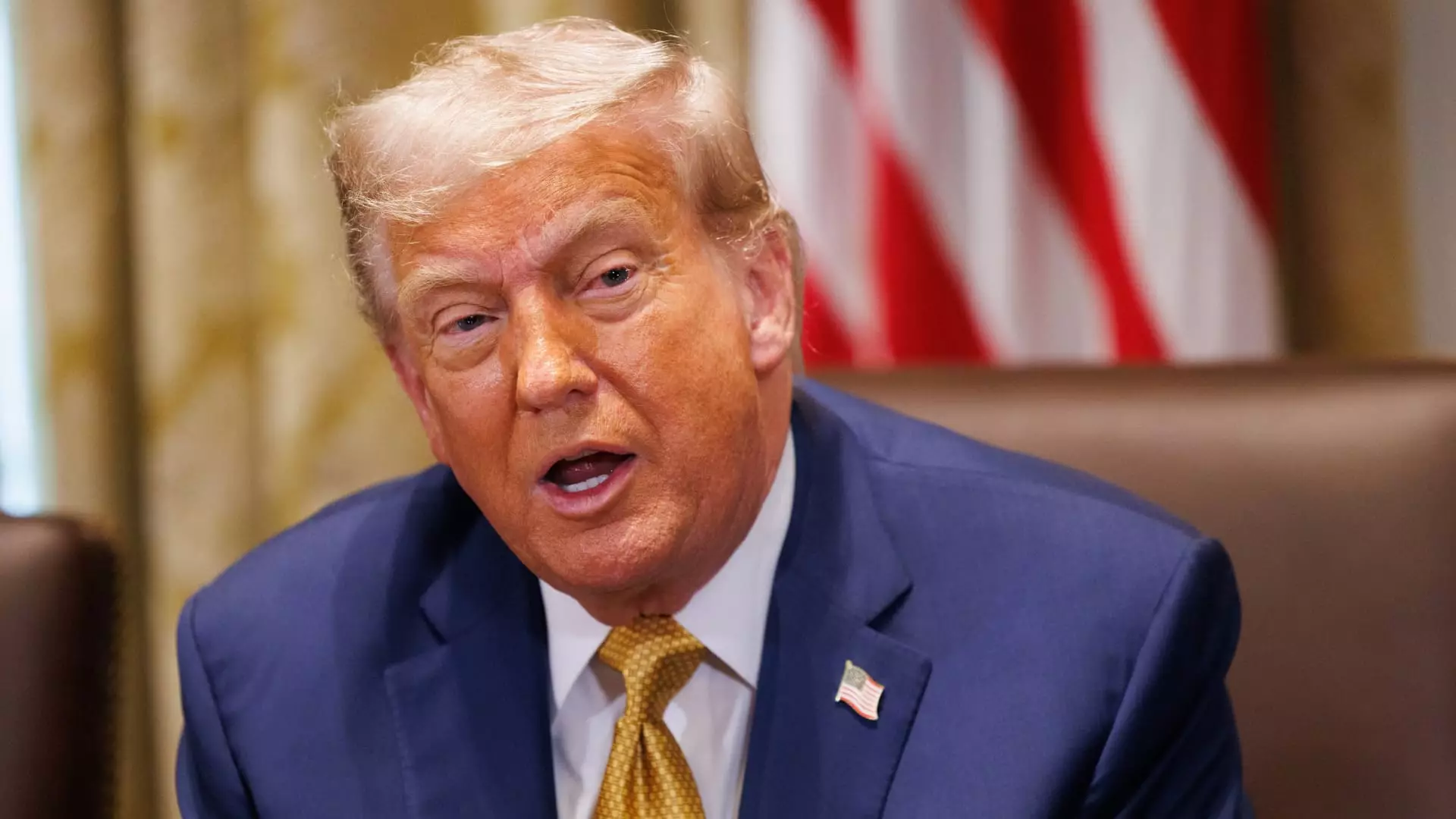President Donald Trump’s recent vow to slap up to 200% tariffs on imported pharmaceuticals reveals a dangerous miscalculation rooted in misguided nationalism. While his rhetoric might appeal to a populist base by promising to revive domestic manufacturing, the reality is far more complex and troubling. The move is emblematic of a knee-jerk approach that neglects the intricate web of the global pharmaceutical supply chain, innovation ecosystems, and economic realities. Such tariffs, at face value, seem like simple protectionist measures, but their potential consequences threaten to cripple a sector already strained by regulatory burdens and international competition.
The problem begins with Trump’s oversimplified narrative: impose tariffs, and American drug manufacturing will flourish. Yet, this ignores the profound global interdependence that characterizes pharmaceutical innovation today. Most breakthroughs originate from international collaboration, and disrupting these alliances risks stagnating research. Moreover, levying exorbitant tariffs would almost inevitably raise costs for American consumers—patients who rely on affordable medications, not to mention the fact that many drugs are manufactured abroad in countries with lower production costs. His notion that tariffs will incentivize companies to relocate manufacturing to the U.S. is overly optimistic; history shows that reshoring complex production processes is neither quick nor inexpensive.
Unintended Economic Damage and Investment Deterrence
The proposed 200% tariffs are not just a slap on the wrist; they are a blunt instrument that could send shockwaves through the entire pharmaceutical industry. Such high tariffs would drastically increase the costs of importing raw materials and finished medicines, forcing companies to make difficult choices: raise prices, cut R&D budgets, or relocate operations. Each option contains serious drawbacks that could compromise the quality and availability of critical medicines.
Recent history illustrates this point clearly. High tariffs tend to deter foreign investment—an essential ingredient for cutting-edge pharmaceutical research. Countries like the U.S., which have cultivated a strong environment of innovation, risk chilling the global collaboration pipelines needed for breakthroughs. Companies such as Johnson & Johnson, Eli Lilly, and AbbVie have already begun prioritizing domestic manufacturing, but their willingness to escalate this trend is uncertain if tariffs become punitive. It’s a false dichotomy to believe that tariffs will automatically translate into economic revival; more often, they precipitate a decline in foreign direct investment, innovation stagnation, and a shrinkage of the very sector Trump claims to support.
The Politicization of Critical Healthcare and the Risks for Patients
This approach dangerously politicizes the pharmaceutical industry, turning vital healthcare into a bargaining chip. While the government may see tariffs as a way to protect American jobs, the real casualties are patients who depend on affordable, timely access to medications. Price hikes driven by tariffs will disproportionately impact vulnerable populations, elderly patients on chronic medications, and low-income families. The idea that tariffs will somehow incentivize the reshoring of manufacturing glosses over the fact that medicine is not a commodity that can be easily or quickly moved.
Furthermore, the threat of tariffs magnifies the risks associated with supply chain disruptions. The pharmaceutical industry already operates on tight margins and complex logistics; adding tariff-induced costs could cause shortages, delays, or even compromised safety standards if companies cut corners to offset rising expenses. Such scenarios threaten to diminish the reliability of healthcare delivery in the U.S.—a risk far too high to justify a populist gamble that offers uncertain benefits.
Questionable Political Motives and the Lack of Long-Term Vision
Trump’s tariff threats appear driven more by political signaling than by sound economic analysis. While the administration claims these measures will bolster national security, the rationale ignores the fact that the pharmaceutical industry’s security is intertwined with global cooperation and innovation. Section 232 investigations, meant to identify threats to national security, are being stretched thin when applied to complex industries like pharmaceuticals, which are driven by cutting-edge science rather than mere imports.
This tactic also undermines the longstanding bipartisan consensus that prioritizes innovation, free trade, and competitive markets. Properly incentivized, the U.S. has the capacity to lead in pharmaceutical R&D without resorting to trade barriers that could erode the sector’s dynamism. In essence, Trump’s threat to impose steep tariffs is a shortsighted political stunt that risks alienating allies, damaging international partnerships, and ultimately hurting American consumers.
Public and Industry Skepticism: The Reality Check
Not surprisingly, major industry groups and market analysts are wary of Trump’s plans. The Pharmaceutical Research and Manufacturers of America (PhRMA) emphasizes that tariffs will “distract from genuine efforts to foster innovation and manufacturing.” The industry recognizes the importance of domestic capacity but warns that tariffs could do more harm than good—driving up costs, stifling innovation, and damaging the U.S.’s competitive edge.
Market responses have been cautious; pharmaceutical stocks have remained largely unchanged in light of these threats, signaling skepticism about the administration’s sincerity or ability to follow through. Meanwhile, analysts point out that the administration’s history of fluctuating tariffs and trade rhetoric spells uncertainty, discouraging long-term investment in U.S. pharmaceutical manufacturing. The slow, deliberate approach needed for meaningful policy change is replaced by impulsive threats that risk sowing chaos in an already fragile industry.
In embracing protectionism with bold tariffs, Trump risks creating a scenario in which national pride and political posturing overshadow pragmatic economic strategies—strategies that could, paradoxically, weaken America’s leadership in innovation, jeopardize patient safety, and undermine the very manufacturing base he claims to defend.

